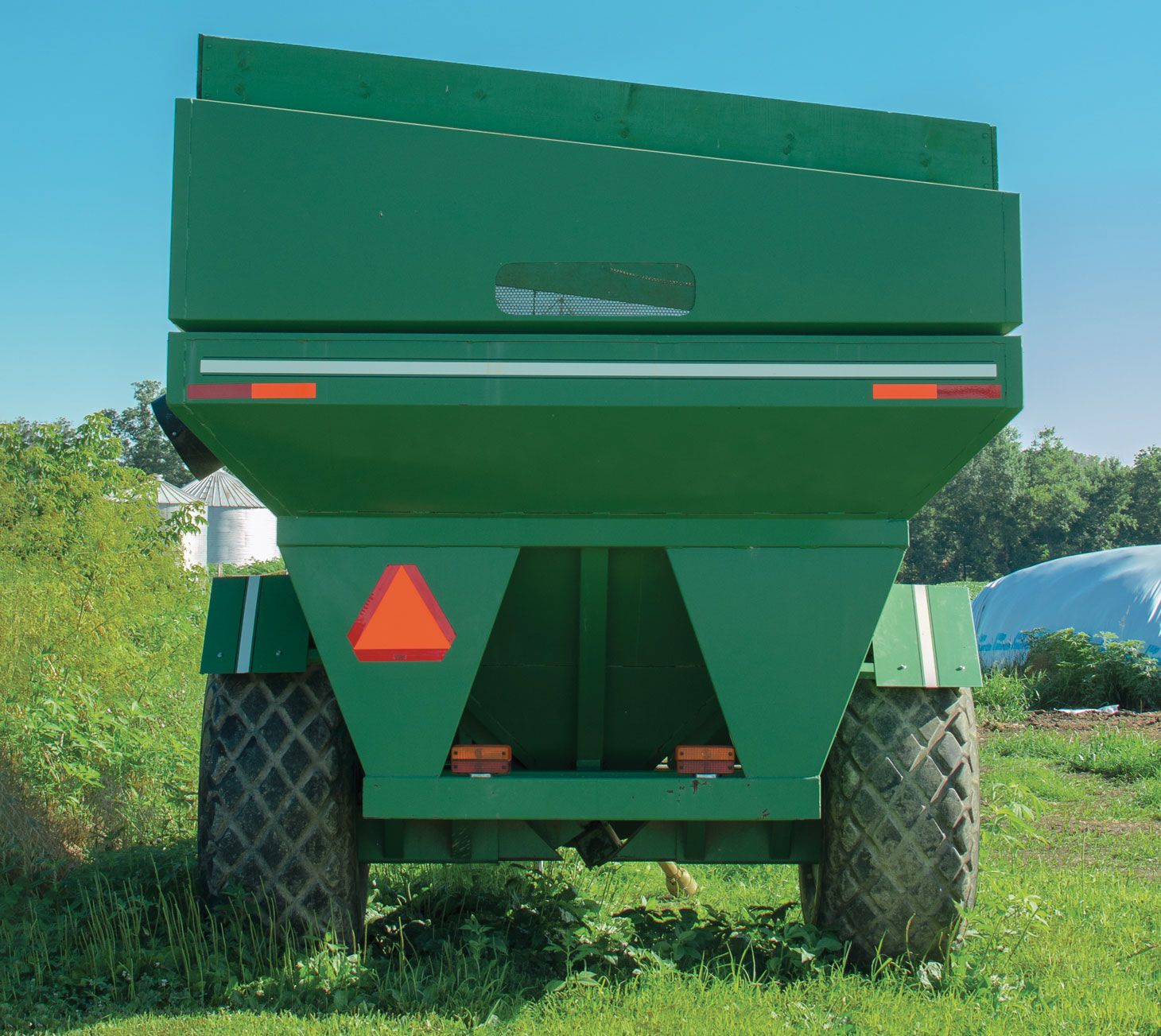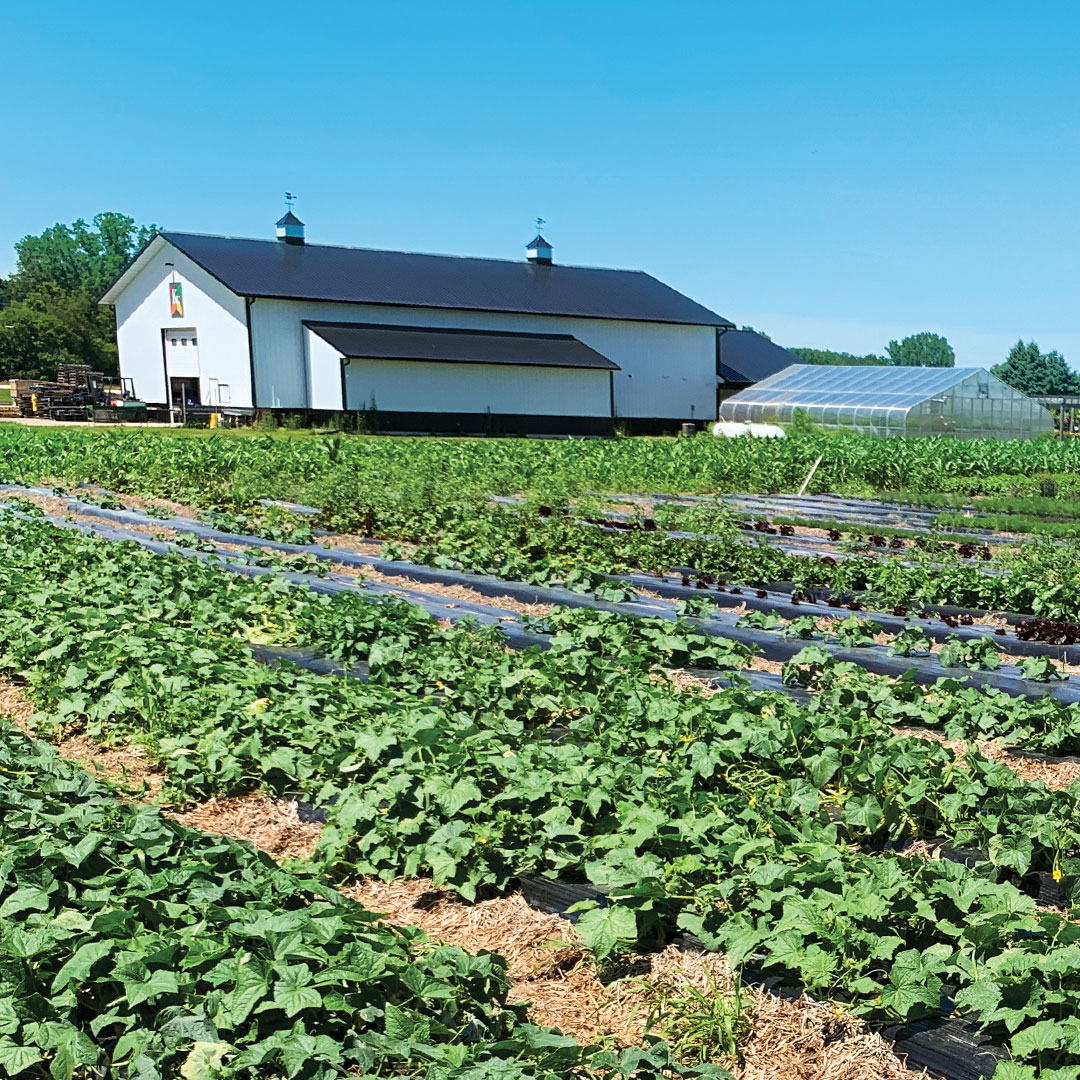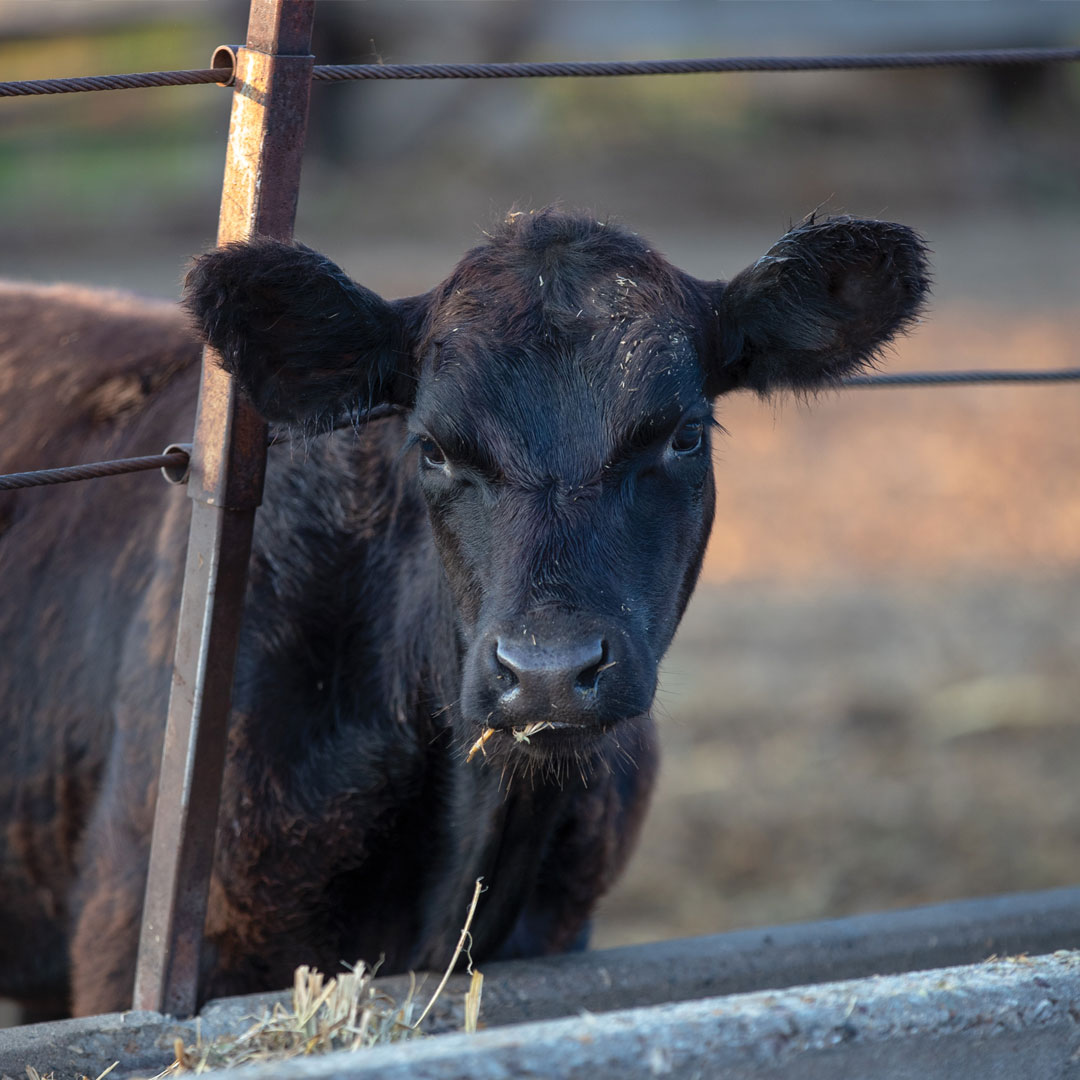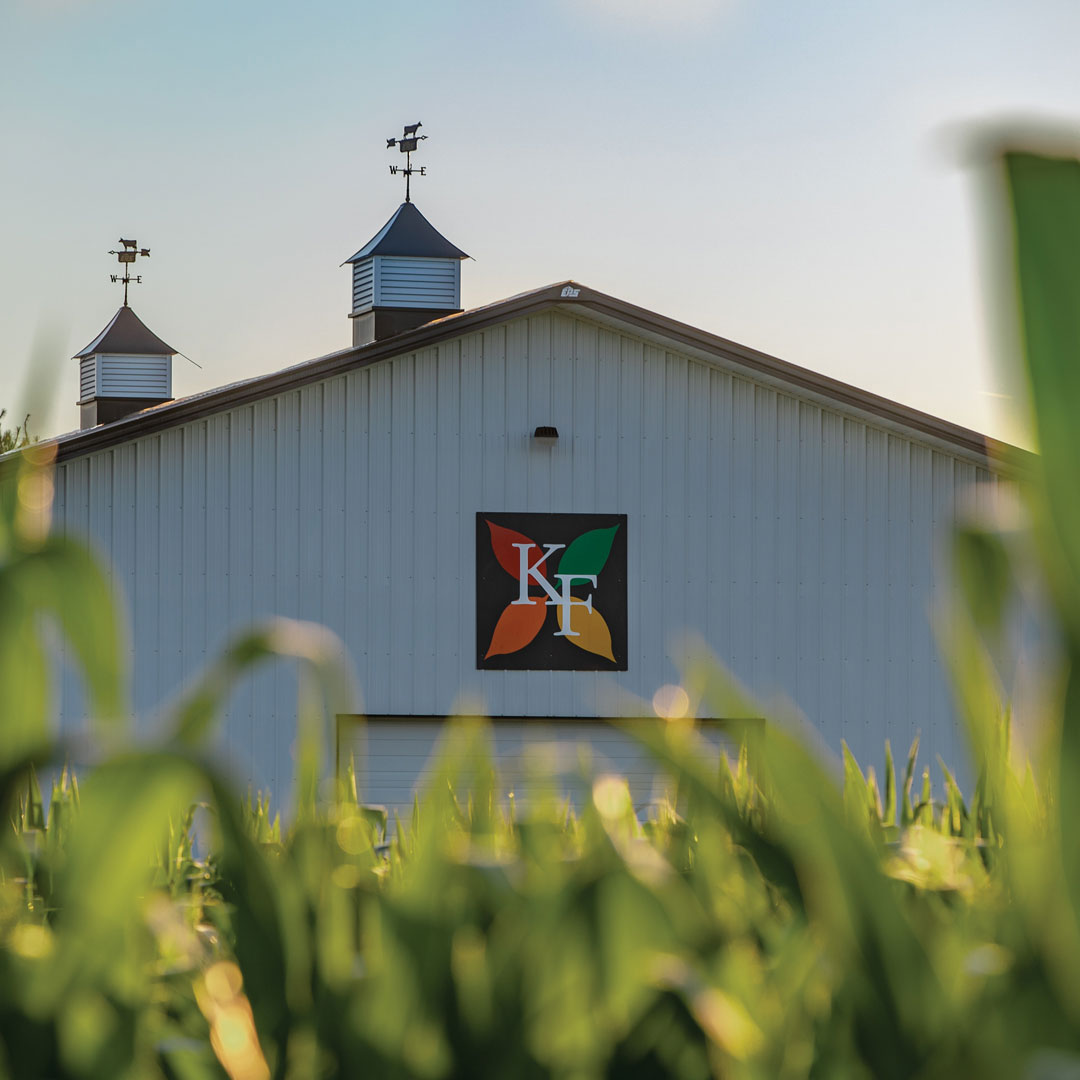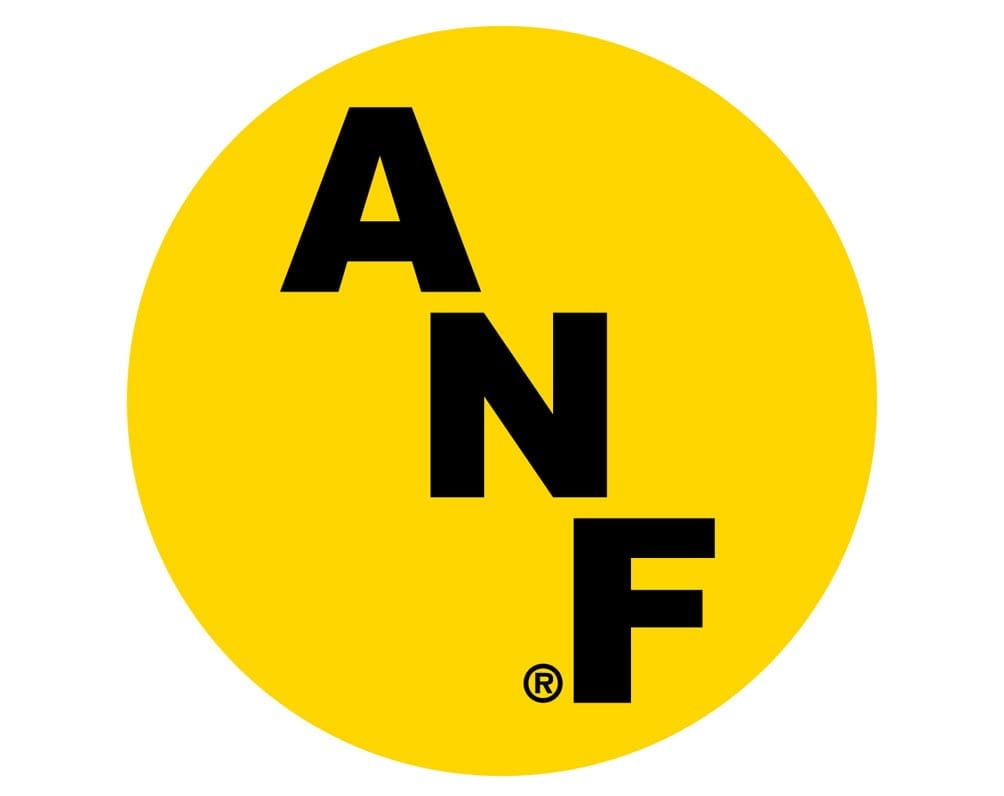IOWA Magazine | 09-02-2019
Home Field Advantage: Matt Kroul Exemplifies the ANF Spirit
By Josh O'Leary
17 minute read
With his playing days behind him, the former Hawkeye football star helps run his family's farm.
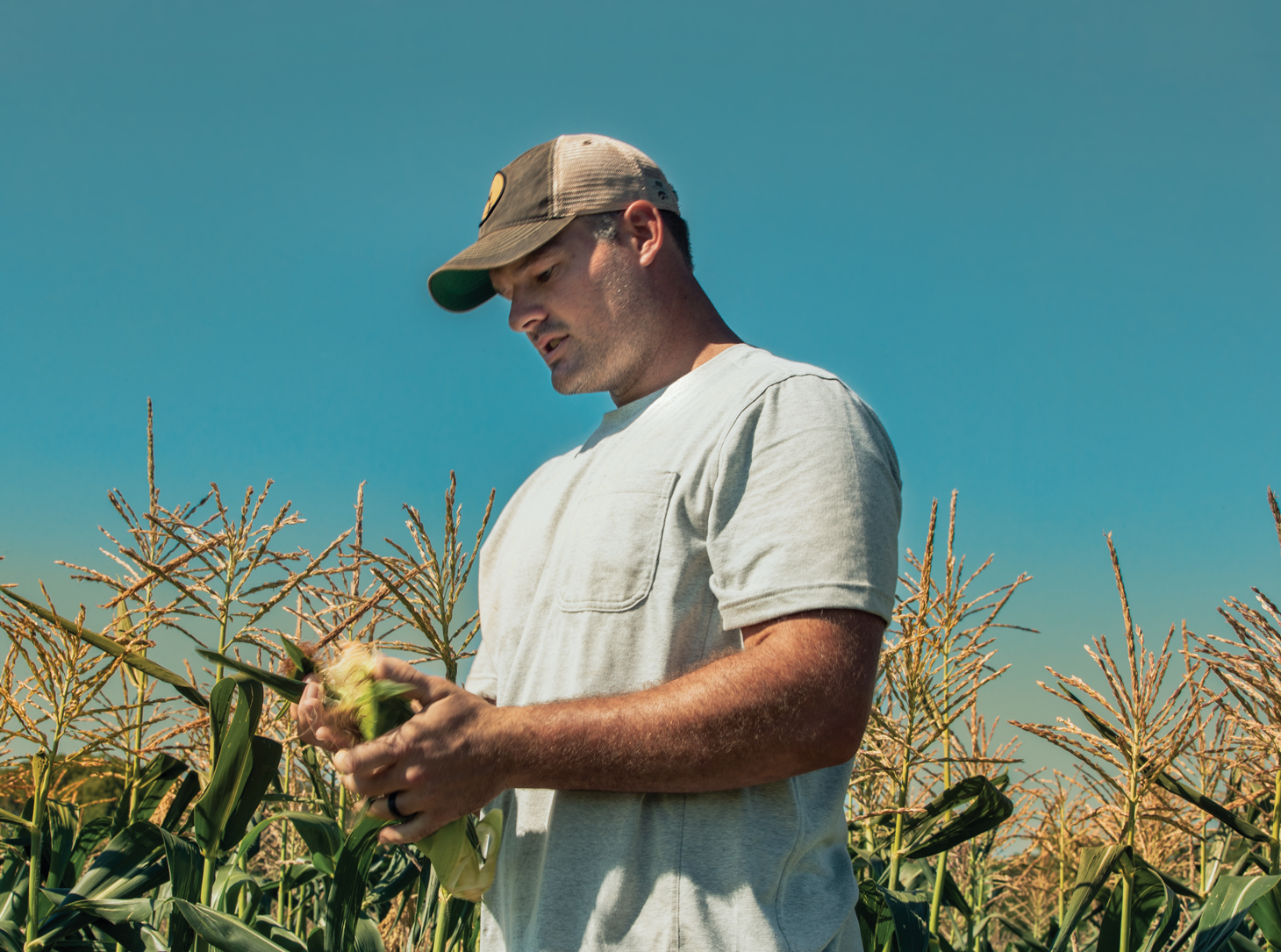 PHOTO: John Emigh
Matt Kroul inspects sweet corn ahead of harvest season on his family's farm near Mount Vernon, Iowa.
PHOTO: John Emigh
Matt Kroul inspects sweet corn ahead of harvest season on his family's farm near Mount Vernon, Iowa.
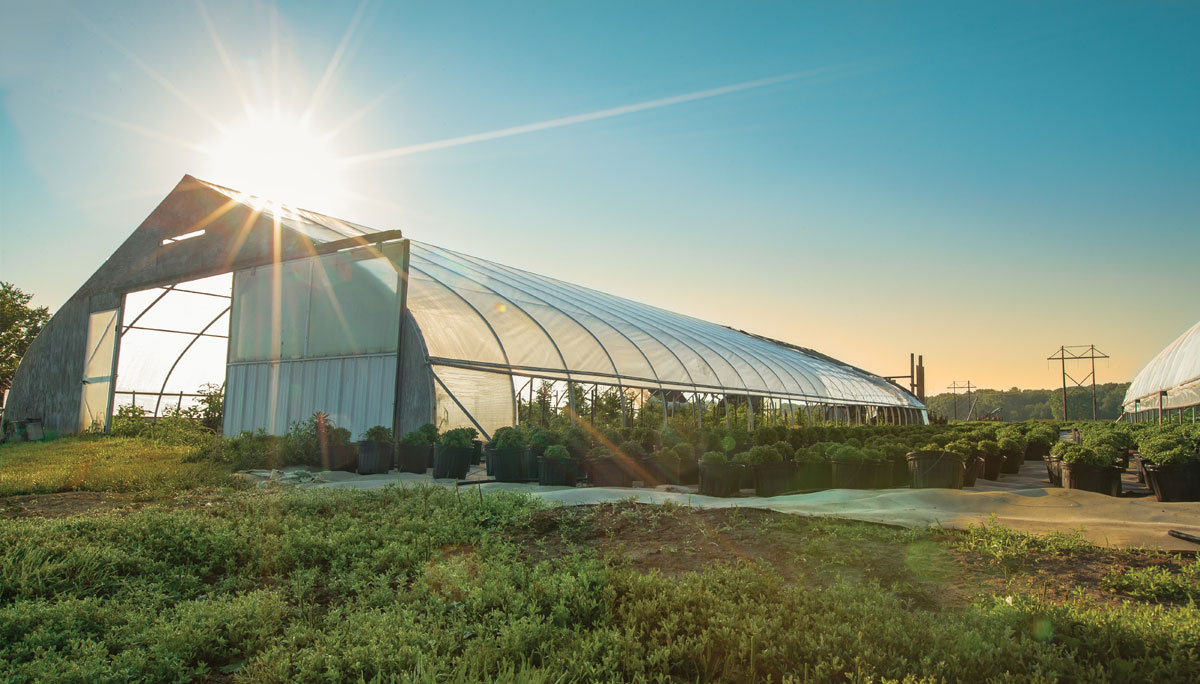 PHOTO: John Emigh
The sun rises over a greenhouse at Kroul Farms.
PHOTO: John Emigh
The sun rises over a greenhouse at Kroul Farms.

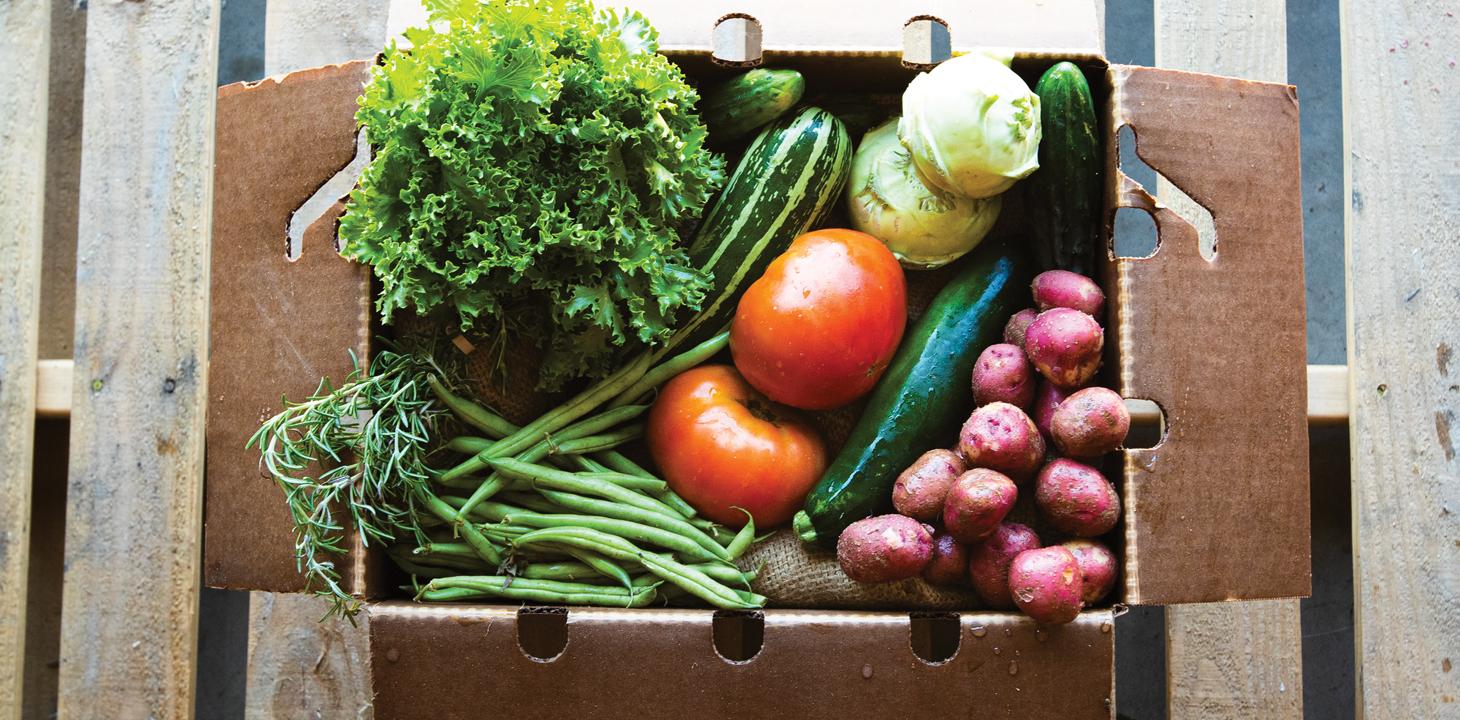 PHOTO: John Emigh
A box of produce is packed and ready for delivery through the Krouls' growing CSA program.
PHOTO: John Emigh
A box of produce is packed and ready for delivery through the Krouls' growing CSA program.

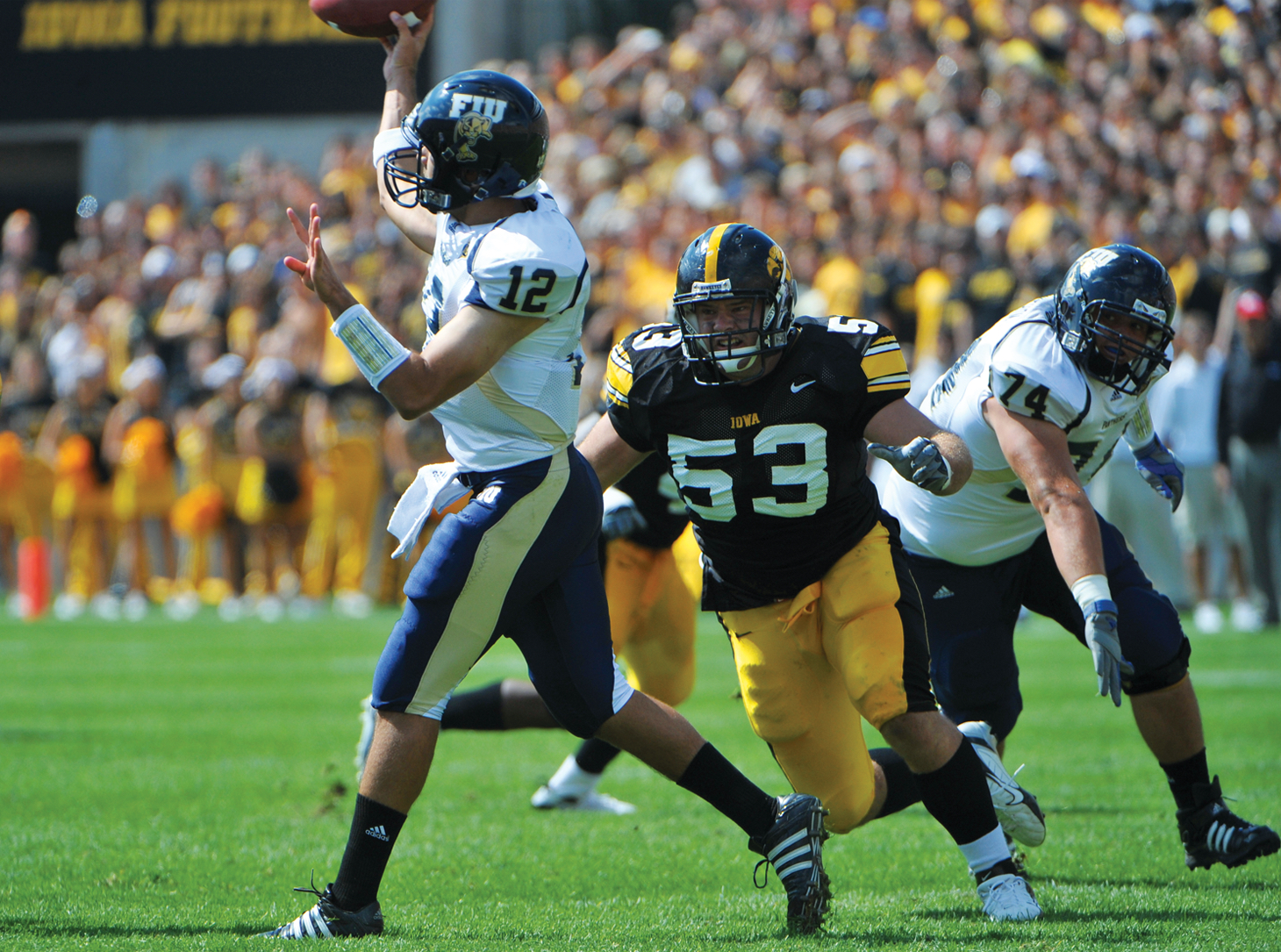 PHOTO COURTESY UI ATHLETICS
Matt Kroul was a
multi-sport standout
at Mount Vernon High
School
before starring at
defensive tackle at
Iowa, where he
set a Hawkeye record
with 50-straight starts
from 2005 to 2008.
PHOTO COURTESY UI ATHLETICS
Matt Kroul was a
multi-sport standout
at Mount Vernon High
School
before starring at
defensive tackle at
Iowa, where he
set a Hawkeye record
with 50-straight starts
from 2005 to 2008.
Matt Kroul steps out of his pickup on a bright summer morning. It's the thick of the growing season here at Kroul Farms, a lush stretch of family-owned timber and cropland along the Cedar River about 20 miles north of Iowa City. Others will soon join him in the fields, but for now, Kroul (08BA) is the lone worker in the shoulder-high sweet corn.
Video: John Emigh
A day on the farm with former Hawkeye star Matt Kroul
Kroul plucks an ear, peels the husk, and examines the pale-gold kernels. A soggy and cold start to the year pushed back the schedule a bit, but the first crop should still be ready for harvesting in the coming weeks. "With the spring the way it was, it's been a six-month grind," says Kroul, who co-owns the farm with his parents, John and Kaylene Kroul. "But you try to stay positive. You adapt, overcome, and hopefully succeed come fall."
Adapt, overcome, and succeed. That mantra has served Kroul well as a captain for the Iowa football team, during his time with the New York Jets, and today as a farmer. It's been seven years since Kroul last played the game, but the work ethic sowed by Iowa coach Kirk Ferentz and his staff still define him. "Don't do only what's expected, and put in the work to make it special—I've always tried to live by that," says Kroul.
Kroul is one in a long tradition of Hawkeyes who grew up chucking hay bales before tossing opponents at Kinnick Stadium. Jared DeVries (98BA), Dallas Clark (07BA), and Robert Gallery (03BA) are just a few of the Iowa farm kids who sprouted into Hawkeye stars in recent decades. "I recruited quite a few farm boys—they're the salt of the earth," legendary coach Hayden Fry once said. "They wanted an education, they were well-disciplined, and they were strong because they had been working on the farm."
 PHOTO: John Emigh
Matt Kroul inspects sweet corn ahead of harvest season on his family's farm near Mount Vernon, Iowa.
PHOTO: John Emigh
Matt Kroul inspects sweet corn ahead of harvest season on his family's farm near Mount Vernon, Iowa.
The bond between Hawkeye football and farming was forged during Iowa's 1985 run to the Rose Bowl. That year, as commodity and land prices withered and thousands of Iowa family farms faced foreclosure, Fry wanted to show his team's support for farmers. To raise awareness for the role Iowans play in feeding the nation, Fry planted a new decal on the helmets of his top-ranked team ahead of its nationally televised game against Ohio State. The gold emblem, affixed above the Tigerhawk on the right side of the helmet, featured three black letters and a simple message: ANF, short for America Needs Farmers.
Today, ANF remains an enduring symbol for Iowans. After Ferentz revived the tradition a decade ago, the Hawkeyes still proudly wear the symbol on fall Saturdays. In a partnership with the Iowa Farm Bureau that began in 2011, the team hosts an annual America Needs Farmers-themed game (this year's date is Oct. 12, 2019 against Penn State), when a former Hawkeye is added to the ANF Wall of Honor in the northwest corner of Kinnick Stadium. Kroul is this year’s ANF honoree, joining a list of football alumni who exemplify the tenacity, work ethic, and character of Iowa farmers.
"You can almost feel the aura and the backing you get from farmers." -Matt Kroul on what it means to wear the ANF logo
Additionally, a second ag-themed game has been added this year to Iowa's home schedule. The Harvest Kickoff Gold game (Sept. 28, 2019 against Middle Tennessee State) is designed to raise awareness of farm safety.
According to Ferentz, Kroul has stood as a shining example of the ANF spirit, first as a team leader, and today as a husband, father, and farmer. "Matt was a really good player on the field, but an even better leader, and so much of it was by example," Ferentz says. "He has just a stellar work ethic, and I know that was instilled in him at home, working at the farm."
Kroul still remembers the team meeting during his junior season when Ferentz announced that he was bringing back the ANF tradition. A 1992 NCAA edict had forced teams to remove "excessive" decals from helmets, but by 2007 the rules had relaxed and the Hawkeyes added a new version of the ANF sticker to the backs of their helmets—gold initials inside an Iowa-shaped border. In 2009, the team returned to the original circular golden decal of the 1980s, and ANF has been a game day fixture ever since. Sales of ANF-stamped merchandise since 2011 have raised nearly $170,000 for the Iowa Food Bank Association.
 PHOTO: John Emigh
The sun rises over a greenhouse at Kroul Farms.
PHOTO: John Emigh
The sun rises over a greenhouse at Kroul Farms.
"To see that logo reemerge on the helmet was pretty special," says Kroul, who these days wears the ANF emblem on a weathered baseball cap. "You can almost feel the aura and the backing you get from farmers."
The university's support for farmers extends well beyond athletics. Iowa's excellence in areas like research, public health, and medicine have resulted in long-standing partnerships with farmers and rural communities (see "Ag at Iowa" below).
At the UI, Kroul majored in health promotion, a program offered by the Department of Health and Human Physiology that led to his advocacy of local foods and agricultural education. He puts his degree to work each fall when busloads of schoolchildren arrive daily at the farm for tours. Unlike some pumpkin patches where bounce houses and zip lines are the main attraction, Kroul Farms remains a working farm and offers visitors an authentic glimpse of country life. "People come here from the city who have never been out to a farm," Kroul says. "Kids can see some of the practices and methods we use, learn where beef comes from, and where eggs come from."

By midmorning, Kroul Farms comes alive. In the garden shop just off Highway 1, customers browse hanging baskets of colorful flowers, bins of strawberries, and cartons of brown eggs. Kroul pulls hay from a cattle barn and piles bundles onto the bed of a customer's truck. A herd of 150 beef cows graze somewhere over the horizon.
Across the highway, where 32 acres are set aside for pumpkins, a garden crew is bent to work. When Kroul arrives in his pickup, he inspects the leafy vines. "They're about to explode," he says—which is a good thing. Come fall, the farm will supply thousands of gourds to local grocery stores and sell countless more here at the farm's produce and flower shop.
 PHOTO: John Emigh
A box of produce is packed and ready for delivery through the Krouls' growing CSA program.
PHOTO: John Emigh
A box of produce is packed and ready for delivery through the Krouls' growing CSA program.
Kroul Farms is about as diverse of an operation as you'll find. All told, the family manages about 1,200 acres of owned and rented land, with half dedicated to row crops and half to timber and pasture. The Krouls take pride in being stewards of the land by carefully harvesting trees and using sustainable practices like natural fertilizers and cover crops to boost soil quality.
The farm can be traced as far back as the 1860s, when Matt's maternal grandmother's ancestors, the Wolfes, first settled on this fertile ground just south of Mount Vernon. Matt was born here in 1986 amid a national farm crisis in which more than 20,000 Iowa family farms went bankrupt. To better weather such economic storms, the Krouls in the years since have diversified their offerings beyond the traditional corn, soybeans, and livestock. Today they sell firewood and lumber, operate five greenhouses, and grow dozens of vegetable varieties. Through their CSA program—short for community-supported agriculture—they deliver a fresh box of produce each week to 89 area households.
Matt has hitched his John Deere to the local food movement, supplying vegetables and firewood to a number of area grocers and restaurants. Kroul Farms' timber also fuels the wood-burning ovens at local pizzerias and barbecue joints. The last several years, Kroul has provided burr oak to Cedar Ridge Winery and Distillery to create a unique whiskey in collaboration with Short's Burger and Shine, an Iowa City restaurant.
"My generation is educating themselves and becoming more aware of where food comes from," says Kroul, who also works as a seed dealer for Beck's Hybrids. "It's never going to be Iowans eating only 100% Iowa food, but you're seeing more people making a conscious decision during our four-month growing season to buy local."

Kroul's earliest athletic feats came on this farm. When he was 6 years old, his mother enlisted him to wrangle piglets out of their huts for vaccinations. Kroul would crawl in, scoop up a squealing pig, and scramble out before the mother sow could sink her teeth into his ankles. For each piglet he absconded with, his mother would reward him with a penny.
Kroul displayed that same fearlessness as a multisport star at Mount Vernon High School. Though he was a four-time state qualifier in wrestling and won a championship his senior year, Kroul made his biggest impact on the football field. As a linebacker and fullback, he set a school record for tackles and rushed for more than 2,000 career yards. He committed to the Hawkeyes before his junior season, following a visit by former Hawkeye assistant Reese Morgan to the farm. At Iowa, strength and conditioning coach Chris Doyle helped mold Kroul into a 281-pound force on the defensive line. Kroul earned a starting spot as a redshirt freshman and never gave it up; by the end of his career he had set a Hawkeye record with 50-straight starts and was a second-team All-Big Ten selection.
 PHOTO COURTESY UI ATHLETICS
Matt Kroul was a
multi-sport standout
at Mount Vernon High
School
before starring at
defensive tackle at
Iowa, where he
set a Hawkeye record
with 50-straight starts
from 2005 to 2008.
PHOTO COURTESY UI ATHLETICS
Matt Kroul was a
multi-sport standout
at Mount Vernon High
School
before starring at
defensive tackle at
Iowa, where he
set a Hawkeye record
with 50-straight starts
from 2005 to 2008.
After Iowa's 2009 Outback Bowl victory over South Carolina, Kroul went undrafted but was scooped up by the New York Jets as a free agent. Over the next three seasons, Kroul spent time on the Jets' practice squad and active roster, appearing in six games in 2010 and eventually converting to the offensive line in a bid for playing time. While Kroul always knew he'd return to Iowa to settle down on his family farm, that day came sooner than expected. "Forced early retirement," as Kroul describes it with a grimace, came in 2012 when he was cut from the team before the start of the season. Instead of returning to Iowa from New Jersey after a long and lucrative career, farming became his livelihood.
Post-football, Kroul continues to adapt, overcome, and succeed. Only now he doesn't measure success in sacks and quarterback hurries, but in hugs and bedtime stories. In many ways, the abbreviated NFL career has been a blessing for Matt and his wife, Nicole Mason Kroul (09BA, 18MA). The couple, who met at Hillcrest Residence Hall during Matt's second year in college, now live in nearby Solon with their young family. Matt says they're fortunate to raise their kids—ages 4, 3, and 1— with Midwest values and a farm-instilled work ethic.
Unlike many former NFL players, Kroul left the game in good health. He finds time to coach his 4-year-old daughter's T-ball and soccer teams, he works with local high school wrestlers in the winter (current Hawkeye football players Tristan Wirfs of Mount Vernon and Tyler Linderbaum of Solon are among his past grappling partners), and each summer he organizes a popular hay bale toss at Solon Beef Days.
Watching his family grow faster than the sweet corn, Kroul doesn't miss the uncertainty of the NFL. Plus, the Iowa sunsets beat those long commutes on the New Jersey turnpike any day. Says Kroul: "There are times when you're out in the pasture checking cows or cutting firewood that you step back and take it all in."
Join our email list
Get the latest news and information for alumni, fans, and friends of the University of Iowa.
How the University of Iowa Helps Farmers
Here are 10 ways the UI serves as a proud partner of Iowa farmers, from engineering research to public health programs.
21ST CENTURY WEATHER VANES
Forget achy joints and the Farmers' Almanac. UI researchers use smart technology to help farmers better predict the weather. Led by Jun Wang, professor of chemical and biochemical engineering and assistant director of the Center for Computer-Aided Design, a UI and Iowa State University team is developing a new forecasting system that uses artificial intelligence, drones, satellite remote sensing, and high-performance computing. By better anticipating what Mother Nature has in store, farmers can maximize yields and cut costs.
Earlier this year, Wang's research team received a $1.6 million grant from the U.S. Department of Agriculture to design and build smart sensors that measure soil moisture and temperature, along with air temperature and humidity levels. Farmers will be able to access data from the cloud via an app and use it to more efficiently schedule irrigation.

VIRTUAL FARMING
Iowa researchers can climb aboard a John Deere and roll through acres of crops—without ever leaving the UI's Oakdale campus. Inside the National Advanced Driving Simulator, a globally known vehicle research center operated by the UI College of Engineering, experts study farm machinery and driver performance. NADS features a full-size Deere 7920 tractor cab, in which test subjects are monitored as they navigate a virtual countryside projected on a massive, wraparound screen.
Recently NADS researchers have used the tractor simulator, as well as a smaller "miniSim," to study how rural roads can be made safer for drivers of farm and nonfarm vehicles. The simulators mimic the dynamic characteristics of a tractor, including braking response, steering geometry, and field of view.

EXPERTS IN THEIR FIELD
Home to the only agriculture safety and health degree program in the nation, the UI offers a master of science in the field through the College of Public Health. Students learn about the ag industry's occupational and environmental exposures and risks, as well as how to anticipate, treat, and prevent farm illnesses and injuries. Graduates find careers in education, health care, insurance, agribusiness, and other fields.
The College of Public Health also offers training opportunities for health care workers interested in agricultural safety and health. A five-day program this past summer, led by associate professor Diane Rohlman, featured farm visits, a grain bin rescue demonstration, ag expert panel discussions, and presentations on rural issues like telemedicine.

ADDRESSING MENTAL HEALTH
Farming is known to be physically demanding work, but the strain it can put on workers' mental health is a less talked-about and often hidden occupational hazard. Experts say economic volatility, social isolation, and chronic pain can all lead to mental health problems. A 2017 UI study published in the Journal of Rural Health and co-authored by College of Public Health professor Corinne Peek-Asa found that the suicide rate among farmers was well above the combined rate for workers in all other occupations. With that in mind, the UI-based Great Plains Center for Agricultural Health participated in a national awareness campaign this past May to break the stigma associated with mental health problems and highlight the resources available to farmers.

NOT-SO-GOOD VIBRATIONS
Farmers often spend hours a day seated atop rumbling tractors and other ag machinery. But what toll do those machines take on their body? In a recent study, Nathan Fethke (96BSE, 00MS, 06PhD), UI associate professor of occupational and environmental health, examined the effects of mechanical vibrations on farmers. Fethke measured whole-body vibration by attaching sensors to the tractors, combines, forklifts, skid loaders, and all-terrain vehicles of more than 50 Midwest farmers. He says long hours aboard the machines can increase the frequency of back pain episodes for farmers, which can lead to high medical costs. Fethke encourages farmers to check the seat suspension systems to ensure they are greased, working properly, and adjusted for their body weight.

PROTECTING FARMERS' HEALTH
The Great Plains Center for Agricultural Health is one of 11 agricultural research, education, and prevention centers funded by the National Institute for Occupational Safety and Health. Located at the UI College of Public Health, the institute works to reduce workplace injuries and illnesses among Midwest farmers. Recent projects at the center include preventing roadway accidents involving ag equipment, protecting livestock workers from harmful indoor air contaminants, and chronicling pesticide drift.
In the latter project, a pair of former graduate students—Jessica Ricchio (18MS) and Amy Kopale (17BA, 19MA)—developed an interactive web tool that tracked and analyzed 450 cases of pesticide drift in Iowa. Their goal was to identify the important risk factors associated with pesticide drift—humidity, application method, and wind speeds, among other contributors—to help farmers improve safety and efficiency. The drift maps can be found at foriowa.info/pesticide.

CAUTIONARY TALES
Iowa farmer Leon Sheets was pressure washing a poorly ventilated swine building one day in 2014 when disaster struck. His spray broke methane bubbles in the foaming manure beneath a slatted floor, and an LP heater ignited the methane. A giant fireball engulfed the building. Sheets suffered third-degree burns and was hospitalized for three weeks. Considering himself fortunate to be alive, Sheets shared his experience as part of the Telling the Story Project, a website created by a network of farm safety organizations, including the UI-based Great Plains Center for Agricultural Health. The website features accounts from farmers around the Midwest who have been affected by injuries, fatalities, or close calls on the job. By sharing these stories, project leaders aim to prevent similar incidents on other farms.

DOWN-TO-EARTH STUDENTS
On the outskirts of campus, near the Hawkeye Tennis and Recreation Center, students cultivate their green thumbs. The UI Gardeners is a 10-year-old student organization focused on sustainable farming and agriculture. In their third-of-an-acre organic garden, students grow everything from zebra tomatoes to jalapeños to watermelon. They donate much of the produce to local hunger relief organizations, including a campus-based food pantry.
In the winter, the group grows flora and food in a hydroponics greenhouse inside Biology Building East. The club has also partnered with engineering students to develop new growing tools, including a solar-powered watering system and technology that remotely monitors soil conditions.

EARS TO THE GROUND
Farming can be a noisy business. Roaring tractors, the buzz of power tools, and the clamor of hog barns can damage workers' ears. Hearing loss is surprisingly common in farmers, and experts say its effects can be permanent.
The issue is one of the many risks of farming addressed by Iowa's Center for Agricultural Safety and Health, which is housed at the UI College of Public Health. The center was established by the state legislature in 1990 and has since worked to improve the health of Iowa's agricultural population through prevention and education initiatives. In a recent educational campaign, the center distributed informational cards and free ear plugs across Iowa. The main message: If you have to raise your voice to be heard, hearing protection should be worn.

FIGHTING AN AG COMMUNITY CRISIS
A 2017 survey by the National Farmers Union and the American Farm Bureau Federation found that 74% of farmers have been directly impacted by opioid abuse. That includes those who have struggled personally with opioid addiction and those with a friend or family member who has experienced opioid abuse. For many, addiction begins with the use of what are deemed as safe painkillers.
UI med student Sarah Ziegenhorn, founder and director of Iowa Harm Reduction Coalition, and Nicole Novak, a postdoctoral researcher at the UI College of Public Health, conduct opioid overdose prevention training in farm communities. Through "train the trainers" workshops, they have taught more than 120 ag workers how to aid a person experiencing an opioid overdose. Over the past two years, they have distributed nearly 4,000 naloxone rescue kits—a life-saving, overdose-reversing medication that can be expensive and difficult to access in rural areas.
Join our email list
Get the latest news and information for alumni, fans, and friends of the University of Iowa.

